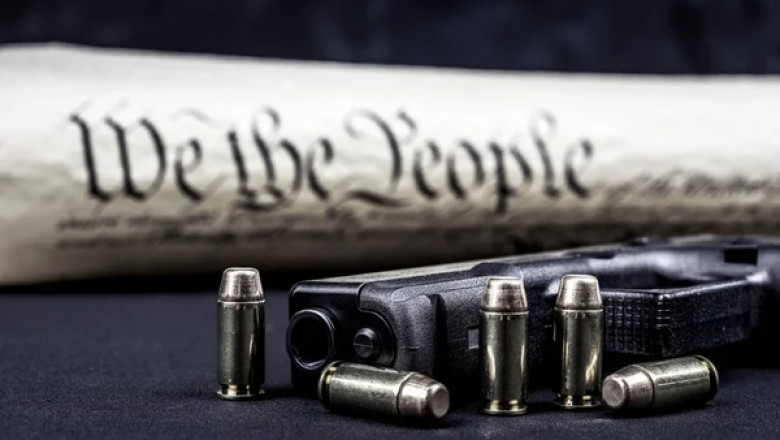views
Discussing firearms often focuses on human rights, legal issues, and security. One key point people often miss is training in the use and safety of firearms. Since firearms are present in daily life for use in sports, hunting, or defense, individuals have a significant duty when they own or use them. Attending courses on firearms and safety is essential to becoming a gun owner, as they help people be more responsible, safe, injury-free, and educated in the proper use of guns.
Promoting Responsible Ownership
Taking on the role of a firearm owner comes with great responsibility. Using firearms in the wrong way can lead to harm and danger, which is why proper care is necessary. Completing a safety course equips firearm owners with the realization of how important their duties are in handling guns. Most of these courses focus on how to handle, store, and use firearms legally. If family members know how to handle and store guns away from youngsters, they become safer from accidental gun-related accidents.
Furthermore, responsible ownership includes understanding the moral and legal implications of using a firearm. Firearms training often discusses scenarios where the use of force is justified and where it is not. This education is crucial in helping individuals make the right decisions during high-stress or threatening situations.
Enhancing Public Safety
Public safety is a shared responsibility; educated firearm owners contribute significantly to a safer society. When trained, individuals are less likely to misuse a weapon, intentionally or accidentally. Training teaches individuals how to de-escalate confrontations and rely on a firearm only as a last resort.
Moreover, in communities where more people have received safety training, there is a lower incidence of negligent discharges and improper firearm use. Law enforcement agencies often advocate for civilian training because it supports their efforts in maintaining peace and order. The more the public understands safe firearm practices, the fewer misunderstandings and preventable incidents occur.
Reducing Accidental Injuries and Deaths
One of the most compelling reasons to support firearms and safety courses is the potential to save lives. According to various studies and health statistics, many firearm-related injuries and deaths are accidental. These include mishandling of weapons, unintentional discharges, and improper storage. Tragically, children are often the victims of these accidents.
Gun safety classes equip participants with knowledge on how to load, unload, and clean firearms safely. They also stress the importance of unloading firearms and locking them when not in use. Promoting habits like checking the chamber, pointing the muzzle in a safe direction, and keeping fingers off the trigger until ready to shoot, these courses help prevent common errors that can lead to fatal outcomes.
Building Confidence and Competency
Fear and unfamiliarity are dangerous combinations when dealing with firearms. Safety training removes these elements by replacing ignorance with knowledge and fear with confidence. Participants learn how firearms function, how to handle recoil, aim accurately, and carry and transport guns properly.
This confidence improves shooting accuracy and reduces anxiety and stress in potentially dangerous situations. A well-trained individual is far less likely to panic or act impulsively. Instead, they can respond calmly and rationally, which is critical in emergencies.
Fostering a Culture of Accountability
Firearms safety education is vital in fostering a culture of accountability and ethical behavior. When people undergo training, they understand the importance of following laws, respecting others, and prioritizing safety over pride or aggression. Such individuals are more likely to influence others positively and encourage responsible community behavior.
Furthermore, courses often emphasize continued education and regular practice. Much like driving a car, using a firearm safely is not a skill to be learned once and forgotten. Repeated training helps reinforce good habits and keeps skills sharp.
Supporting Legal Compliance
Every region, state, or country has specific laws governing firearms use, ownership, and transportation. A well-structured safety course typically includes an overview of these legal aspects, helping participants stay compliant and informed. This education protects gun owners from unintentionally breaking laws that could result in fines, license revocation, or even criminal charges.
Additionally, understanding local laws about self-defense, storage requirements, and carry permits is crucial for anyone who owns or intends to own a firearm. Firearms safety courses ensure that owners are legally compliant and aware of their rights and limitations.
Encouraging Responsible Hunting and Sportsmanship
Safety courses are equally important for those who use firearms for sport or hunting. Hunters need to understand more than marksmanship; they must learn about wildlife regulations, environmental conservation, and humane harvesting practices. Courses geared toward sports shooters also teach range etiquette, competition rules, and the importance of discipline.
Responsible sportsmanship enhances the image of gun owners and contributes positively to the public perception of firearm use. It shows that firearms can be used constructively and respectfully with the proper training and mindset.
Educating the Next Generation
Finally, firearms and safety course are instrumental in educating younger generations. Whether in the form of youth shooting programs or family-oriented safety seminars, these educational efforts teach kids about respect, responsibility, and the dangers of mishandling weapons. Education is the best defense against curiosity-driven accidents among children.
These courses create a safe and structured learning environment, demystifying firearms and empowering young people to make informed, safe decisions. Parents taking these courses are better equipped to talk to their children about gun safety.
Final Thoughts
Firearms are tools that carry great power and, with that, an equally great responsibility. Firearms and safety courses are not just optional learning experiences—they are essential for anyone who owns, uses, or is regularly around guns. These courses promote responsible ownership, reduce accidents, build confidence, ensure legal compliance, and enhance public safety. In a society where firearm-related incidents can have devastating consequences, education is one of the most effective tools we have to mitigate risk and protect lives.






















Comments
0 comment